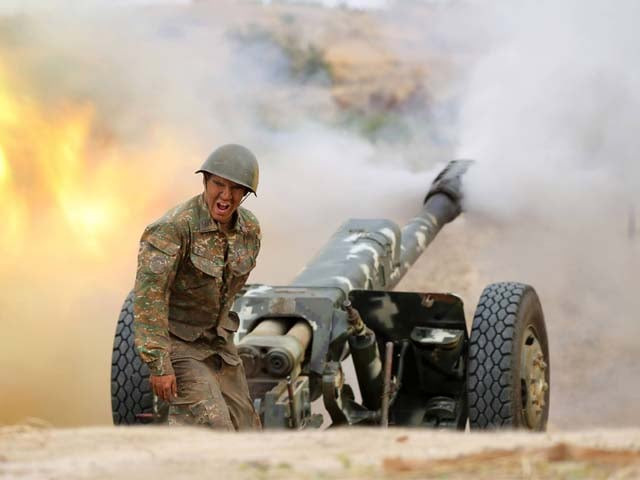The two former Soviet territories of Armenia and Azerbaijan are in the headlines again. Normally, as is true for the wont of news cycles, Armenia is in the news usually for its claims regarding the Armenian Genocide to be recognised as the first great genocide of the 20th century – even before the Holocaust decades later – and the seeking of an apology from Turkey over the actions of its predecessor state at the time, Ottoman Turkey. Azerbaijan is more known to us because of its kleptocracy disguised as a democracy in an oil-rich state.
However, the Nagorno-Karabakh dispute which began in the late 1980s during the twilight years of the Soviet Union has continued to poison relations between the successor states of the Soviet Union. The recent confrontation between the two states began last month, and casualties continue to mount on both sides, threatening to involve regional powers Turkey, Iran and Russia.
In Pakistan, the issue is viewed away from the complexity of the right of self-determination and more from a pan-Islamic perspective; therefore the Pakistani government has been quick to toe the line of the Turkish government on the matter, expressing its solidarity with Azerbaijan, notwithstanding the fact that when the conflict started more than three decades ago, the Armenian-majority enclave of Nagorno-Karabakh had voted to secede from Azerbaijan and reunite with Armenia.
In such instances, more often than not it is poets who come to our rescue, giving us a message of hope and strength during troubling times. Habib Jalib is a unique Urdu poet of our era who penned verses on some of the most pressing affairs of the 20th century, whether local, regional or international. Therefore, it was not a huge surprise finding his short poem “Armenia Ke Logon ka Nauha” (Requiem for the Armenian People) among his Kulliyat (Collected Works); the wonder was that against expectation, Jalib had composed the poem to mourn the dead of the devastating Armenian earthquake of December 1988, which killed up to 50,000 people. The earthquake came at a time when the inhabitants of Nagorno-Karabakh had begun demanding the right of self-determination from the USSR authorities, including union with Armenia. Knowing the arch-political Jalib, one had expected the poem to be about the Armenian genocide or the problems of Nagorno-Karabakh, which had begun by that time.
It is only when one comes to the final couplet:
“Jaan-leva aafaton par fateh paa li hai abhi
Kon kehta hai keh hum ne manzilon ko paa liya”
that the reader realises that the poet actually prefigures the present calamity befalling the region. For this poem needs to be re-read today in the hope that the salvation of the benighted people of Nagorno-Karabakh does not really lie in overcoming a natural disaster or man-made war, but rather in the realisation of the right of the enclave to self-determination and the end of enslavement of Man by Man, in this case enslavement by one big power or another.
~
“The earthquake seized upon yards singing and laughing in mirth
The moon-faced faces were gobbled up by unexpected death.
Their pain will not be reduced, the people who faced this misery
Meanwhile we come to terms with it by composing some poetry.
For their flower-like children the mothers waited
Hai! They never returned, for to the cemetery they headed.
In an instant the region of fairies was laid desolate
O Heaven, for which earthly sin did you choose to retaliate.
For now we have conquered the deadly afflictions
But who says that we have attained the destinations.”



COMMENTS (3)
Comments are moderated and generally will be posted if they are on-topic and not abusive.
For more information, please see our Comments FAQ